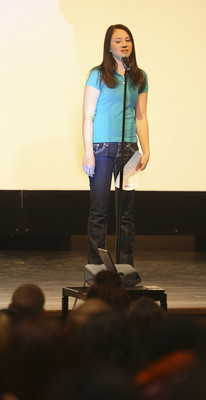Pizzas explain political process
Caitlin Stolworthy says she has heard the admonition from schoolteachers for as long as she can remember: If you're old enough to vote and don't, you really have no right to complain about government decisions you don't like.
What has been strictly theoretical for the 17-year-old Legacy High School senior is fast approaching reality.
And she couldn't be happier.
"It makes me excited to think that when I do my homework on candidates for president of the United States it won't just be for a class," Stolworthy said before representatives of the Nevada Democratic and Republican parties engaged Legacy seniors Tuesday in an exercise designed to teach them how to participate in the Jan. 19 presidential caucuses. "This is so great, getting a chance to see how a caucus will work."
Right now, Stolworthy isn't sure whether she'll go to a Republican or Democratic caucus. No wonder. She appreciates the experience of Democrat Hillary Clinton and the business expertise of Republican Mitt Romney.
"I've got more research to do," said Stolworthy, the student body president.
With early caucuses and primaries going a long way toward making or breaking a candidate's dream of serving as president, nobody can accuse either major political party of not courting the youth vote as Nevada's early date on the presidential nominating calendar focuses national attention on the Silver State.
Kirsten Searer, spokeswoman for the state Democratic party, said the mock caucus at Legacy High School was the eighth involving Clark County high schools, with nearly 3,000 students now having learned how the caucus process works through a nonpartisan education program.
Any Nevadan who will turn 18 before the general election, on Nov. 4, 2008, is eligible to participate in the January presidential caucus, even if she or he is only 17 at the time of the caucus.
About 400 Legacy High School students caucused Tuesday for their favorite pizza instead of their favorite presidential candidate. Whether the enthusiasm they exhibited -- there was much loud banter, for example, between supporters of pepperoni and those who supported cheese topping -- will translate into actual involvement in the political process is anybody's guess.
Neither Heather Kidd, caucus representative for the state Republican party, nor Jayson Sime, caucus director of the state Democratic party, would estimate just how involved 18-year-olds would be either in the caucuses or the general election.
Legacy senior David Rogalski, 17, said he's leaning toward Republican Rudy Giuliani.
"He seemed to do a good job in New York City," he said.
Vietnam War politics lowered the voting age from 21 to 18 in 1971. During 1972's Nixon vs. McGovern presidential election, youth turnout -- classified as 18-to-24-year-olds -- was 52 percent. It has never been that high again.
The low youth-turnout mark came in 2000, during the Bush vs. Gore election, when just 36 percent went to the polls.
In 2004, 47 percent of voters aged 18 to 24 turned out.
Stephanie Hirsch, a coordinator with the curriculum and professional development division of the Clark County School District, thinks the attention teens are receiving is going to pay dividends at the polls.
"You can see how enthusiastic they are," Hirsch said, after students yelled in support of anchovy pizza.
The caucus process designates delegates from local precinct meetings to county conventions and the state convention. Those delegates then choose delegates who go to the national convention to select the party's presidential candidate.
While Kidd easily explained that the Republican caucus system is set up to be a one person, one vote system, Sime had the unenviable task of trying to explain to students that for a particular candidate to be "viable" in the Democratic caucus, he or she must gain backing from a certain percentage of all the caucus participants. If the group doesn't have enough people, it must disband and participants must support another candidate.
"The Democrats' way seems messy," Stolworthy said.
"The Republican method is easier," Rogalski said.
One student who really got into the mock caucus, 17-year-old Korby Wesley, wasn't happy after it ended. His birthday is two days after the Nov. 4 general election.
"I'd really like to vote and do the caucus," he said. "Just two days and I really feel like I'm left out."
Contact reporter Paul Harasim at pharasim@reviewjournal.com or (702) 387-2908.
2008 ELECTIONSGet more news, voter information
VOTER REGISTRATION REQUIREMENTS
U.S. citizenship
Be at least 18 years old by Election Day. If you are now 17 and will be 18 by Election Day, you may register now.
Continuously have resided in Clark County for at least 30 days and in your precinct for at least 10 days before the next election
Claim no other place as your legal residence
Have no felony conviction or other loss of civil rights that would make it unlawful for you to vote. Convicted felons who have been honorably discharged from probation or parole, pardoned by the governor or released from prison may be eligible to vote and should call 455-0075 for information about their individual situation.
No court of law has determined you are mentally incompetent
For more information, call 455-VOTE (8683).
SOURCE: Clark County Elections Department


















